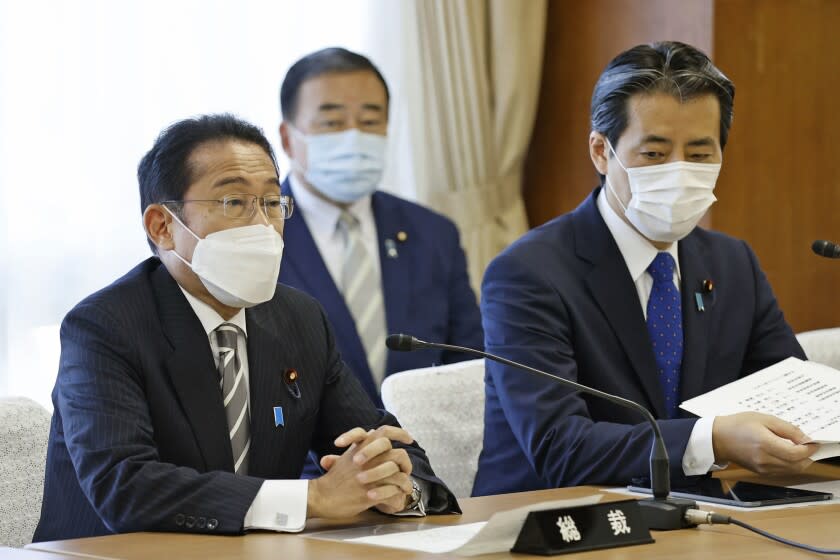Japan's leader names new Cabinet to distance his administration from Unification Church

- Oops!Something went wrong.Please try again later.
- Oops!Something went wrong.Please try again later.
Japanese Prime Minister Fumio Kishida reshuffled his Cabinet on Wednesday in an apparent bid to distance his administration from the conservative Unification Church over its ties to the assassinated leader Shinzo Abe and senior ruling party members.
The reshuffle was the second in just 10 months since Kishida took office following the July election victory that had been expected to ensure long-term stability until 2025. Abe’s shocking assassination July 8 and its impact on politics increased uncertainty instead as public support for Kishida’s Cabinet plunged.
Kishida told reporters Tuesday that a “strict review” of candidates’ ties to the church would be a “prerequisite” in the new lineup of Cabinet officials and Liberal Democratic Party executives.
He said he had instructed his ministers and other senior officials to clarify their connection to the South Korea-based Unification Church “so that we can achieve political and administrative work that can be trusted by the people.”
Abe was fatally shot while giving a campaign speech two days before the parliamentary election. Police and media reports say the accused gunman targeted Abe over suspected ties to the Unification Church, which the man hated because his mother’s massive financial donations to the church ruined his family.
Abe, in a video message last September to the church affiliate the Universal Peace Foundation, praised its work in support of peace on the Korean Peninsula and its focus on family values. Some experts say Abe's video appearance may have motived his alleged killer.
The ties between the church and Japan’s governing party go back to Abe’s grandfather Nobusuke Kishi, who served as prime minister and shared U.S. concerns over the spread of communism in Japan in the 1960s.
The church since the 1980s has faced accusations of devious recruitment and brainwashing of its adherents into making huge donations.
On Wednesday, Tomihiro Tanaka, president of the church, which now calls itself the Family Federation for World Peace and Unification, told a news conference that the church-related foundation that Abe was linked to is more politically active and involved in election campaigns.
But Tanaka denied any “political interference” with specific parties and said that Kishida's call for his party members to distance themselves from the church was “regrettable.”
Tanaka said the church and its affiliate groups have naturally developed closer ties with the Liberal Democratic Party conservatives than with others because of their shared anti-communist stance.
“We've worked together with politicians who have clear views against communism in order to build a better country," Tanaka said. “We are pursuing the activity not only in Japan but as part of our global network against communism.”
Kishida said the main purpose of the reshuffle was to “break through one of the biggest postwar crises” in Japan, encompassing the COVID-19 pandemic, inflation, growing tensions between China and Taiwan, and Russia’s war on Ukraine. He was expected to further explain the new Cabinet at a news conference later Wednesday.
A survey released Monday by the NHK public television network showed support for Kishida's Cabinet fell to 46% from 59%.
Most of the respondents said they think politicians had not sufficiently explained their ties to the Unification Church. Kishida’s plan to hold a state funeral for Abe has also split public opinion because of Abe’s arch-conservative stances on national security and wartime history. Critics see a state funeral as the government's attempt to glorify Abe’s legacy.
Chief Cabinet Secretary Hirokazu Matsuno, who retained his post, announced the new lineup, including five members who kept their Cabinet posts, another five who were brought back and nine first-timers.
Seven ministers who acknowledged their ties to the church were removed. They include Defense Minister Nobuo Kishi, Abe's younger brother, who said that church followers were volunteers in his past election campaigns, and Public Safety Commission Chairman Satoshi Ninoyu, who attended an event organized by a church-related organization.
Kishi was replaced by former Defense Minister Yasukazu Hamada. Taro Kono, who previously served as a vaccination chief during the pandemic and as foreign and defense minister, returned to the Cabinet as digital minister.
Economy and Trade Minister Koici Hagiuda, who also had church ties, was shifted to head the party policy research committee and replaced by former Economy Minister Yasutoshi Nishimura. Katsunobu Kato was appointed health minister for the third time, tasked with coronavirus measures.
Despite criticism that Japanese politics is dominated by older men, the majority of the Cabinet members are still men older than 60, with only two women.
They include Sanae Takaichi, an ultra-conservative close to Abe who was appointed economic security minister, and Keiko Nagaoka, a first-timer who became education minister and replaced Shinsuke Suematsu, who also acknowledged his Unification Church links.
Gender Minister Seiko Noda, who admitted to sending a message to a church-related group’s event in 2001 that was attended by her aide, was replaced by Masanobu Ogura, a Cabinet novice.
This story originally appeared in Los Angeles Times.

